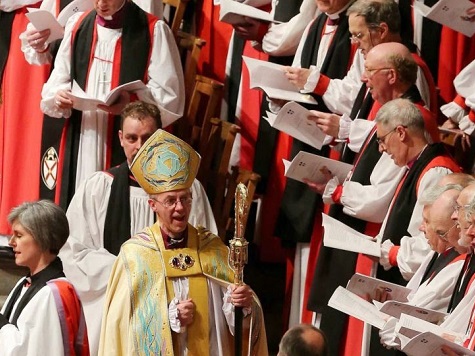A non-Christian is set to address the Church of England’s General Synod for the very first time on the 18 November, but the man chosen is none other than Fuad Nahdi, a British Muslim with ties to the radical Muslim Brotherhood. (h/t, the Gatestone Institute)
The synod will discuss the “unspeakable evil” of the recent persecution of Christians and other minority faiths in Syria and Iraq. The discussion will led by a panel which includes Nahdi, Bishop Angaelos, who is the leader of the Coptic Christian Church in the UK, and also the Bishops of Coventry and Leeds, the BBC has reported.
Synod general secretary William Fittall told the BBC: “We have certainly had people from other faiths in the gallery who have been greeted by the synod, who have been welcomed,” but he believed that it was the first time that a non-Christian was addressing the assembly of church leaders.
Nahdi, described by the BBC as an “activist and journalist” is actually the founding editor of the Muslim magazine Q News. He is also executive director of the Radical Middle Way (RMW) faith group, which he founded in the wake of the 7/7 London bombings. The group receiving over £1.2 million from the Labour government between 2006 and 2009 as part of their PREVENT strategy, which was subsequently deemed a disaster and scrapped by the Coalition.
Almost immediately the links between RMW and the Muslim Brotherhood became clear, with Martin Bright reporting in the New Statesman in 2006 that a scholars roadshow organised by RMW, funded by the Foreign Office, featured speakers from three groups: Q-News, the Federation of Student Islamic Societies and the Young Muslim Organisation, the latter two of which are “heavily influenced by the ideology of the Muslim Brotherhood, the Islamist group, well established across the Middle East, which is committed to establishing Islamic rule under sharia law.” The Foreign Office shortlisted the three organisations based on perfunctory internet research and direct contact.
Two years later, in 2008, whilst still claiming government funding, RMW featured speakers including Kemal el-Helbawy, the outspoken supporter of Osama Bin Laden who said “[The Palestinian cause] is an absolute clash of civilizations: a satanic program led by the Jews and those who support them, and a divine program carried by Hamas and the Islamic Movement in particular and the Islamic peoples in general.” He has founded a number of Muslim Brotherhood organisations in the UK.
Other speakers include Jamal Badawi, who advocates for the right for men to beat their wives. He has also described suicide bombers as “martyrs” and “freedom fighters”; and Suhaib Webb, an Islamic scholar who, alongside notorious al Qaeda operative Anwar Al-Awlaki, spoke at a fundraising dinner to raise funds for the legal defence of an Islamic fundamentalist who murdered two American police officers.
RMW has also in the past supported a campaign run by Hizb ut-Tahrir, a British-banned global organisation dedicated to imposing sharia law through jihad, and the killing of all Jews and Muslim apostates.
Even before founding RMW, Nahdi’s fundamentalist leanings were there for all to see. In 1997 he wrote an obituary for the Guardian of an Islamic scholar, Sayed Mutawalli ad-Darsh, who Nahdi described as “respectable, approachable and sensitive — he was the peoples’ Imam.” However, the Gatestone Institute points out that ad-Darsh advocated capital punishment for homosexuality and adultery, and denied that rape can occur with marriage as women may not refuse their husbands advances.
Sam Westrop of the Gatestone Institute said “That a Christian institution has invited a speaker with extremist connections is not particularly surprising. Britain’s “non-violent” extremists realized long ago that by conducting perfunctory charity events and attending interfaith meetings, they could distract the public from their radicalism while burrowing ever deeper into the British establishment.
“What is most troubling is that the first non-Christian to address the Church of England synod can be linked to extreme Islamist networks. By inviting Fuad Nahdi, the Church is lending credence to the notion that only radical Islamism can represent British Islam.
“The Church is deliberately legitimizing extremist ideology. What hope, then, is there for those lonely, genuine moderates within Britain’s Muslim community?”
Sheikh Muhammad Al-Hussaini, an Islamic scholar and interfaith advocate, said: “For far too long, Lambeth Palace and the Anglican interfaith establishment have colluded with and promoted Muslim public relations actors with Islamist connections and a history of double discourse, like Chowdhury Mueen-Uddin of the Muslim Council of Britain and Fuad Nahdi of Radical Middle Way.
“In the context of the heinous persecution of Christian minorities in the Muslim world, the Lambeth Palace-sponsored political spectacle of showcasing Muslims who routinely condemn ISIS, but themselves have Islamist associations with Jamaat-e-Islami, Muslim Brotherhood or other groups and individuals, is a dismal exercise in hypocrisy to the suffering of those non-white and non-Western Christian people who have so badly been let down by the liberal Western Church of England.”

COMMENTS
Please let us know if you're having issues with commenting.